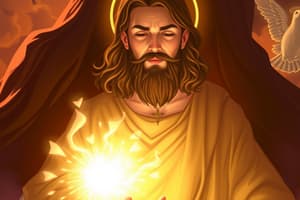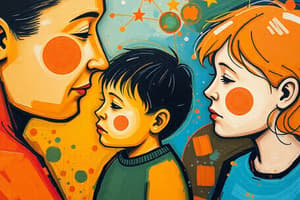Podcast
Questions and Answers
What literary device is predominantly used in the description of Shravana's actions with his parents?
What literary device is predominantly used in the description of Shravana's actions with his parents?
- Allegory
- Metaphor
- Imagery (correct)
- Personification
Which theme is primarily explored through the character of Harishchandra?
Which theme is primarily explored through the character of Harishchandra?
- The significance of love
- The need for justice
- The importance of wealth
- The value of truth (correct)
How does the author convey his feelings about his marriage at a young age?
How does the author convey his feelings about his marriage at a young age?
- With humor
- With nostalgia
- With regret (correct)
- With indifference
What emotional response is evoked when the author recalls playing the tune associated with Shravana?
What emotional response is evoked when the author recalls playing the tune associated with Shravana?
Which narrative technique is primarily utilized in the reflection on the author's feelings and experiences?
Which narrative technique is primarily utilized in the reflection on the author's feelings and experiences?
What does the phrase 'bitter draughts' symbolize in the context of the author's narrative?
What does the phrase 'bitter draughts' symbolize in the context of the author's narrative?
What is the significance of the phrase 'living realities' in regard to Harishchandra and Shravana?
What is the significance of the phrase 'living realities' in regard to Harishchandra and Shravana?
What feeling does the author experience when comparing himself to the young children he looks after?
What feeling does the author experience when comparing himself to the young children he looks after?
What literary term describes the conflict between the husband and Kasturbai due to restrictions imposed by him?
What literary term describes the conflict between the husband and Kasturbai due to restrictions imposed by him?
Which literary device is used when the husband reflects on his feelings for Kasturbai throughout the narrative?
Which literary device is used when the husband reflects on his feelings for Kasturbai throughout the narrative?
How can the husband's desire to mold Kasturbai into an 'ideal wife' be described in literary terms?
How can the husband's desire to mold Kasturbai into an 'ideal wife' be described in literary terms?
What does the husband's awareness of his one-sided ambition indicate about his character?
What does the husband's awareness of his one-sided ambition indicate about his character?
What kind of imagery is prevalent in the husband's depiction of his feelings for Kasturbai?
What kind of imagery is prevalent in the husband's depiction of his feelings for Kasturbai?
Which theme is highlighted by the husband's internal struggle between love and duty?
Which theme is highlighted by the husband's internal struggle between love and duty?
What does the husband's characterization of Kasturbai as 'guileless' suggest about her nature?
What does the husband's characterization of Kasturbai as 'guileless' suggest about her nature?
The husband's insistence on teaching Kasturbai against her will reflects which literary concept?
The husband's insistence on teaching Kasturbai against her will reflects which literary concept?
What literary term describes the character's change in focus from dancing and elocution to pursuing education?
What literary term describes the character's change in focus from dancing and elocution to pursuing education?
Which literary device is employed when the author compares the character's ambitions to the family of the recluse?
Which literary device is employed when the author compares the character's ambitions to the family of the recluse?
What is the significance of the 'bell of alarm' in the passage?
What is the significance of the 'bell of alarm' in the passage?
Which term best describes the character's earlier pursuits of dancing, French, and elocution?
Which term best describes the character's earlier pursuits of dancing, French, and elocution?
What literary term is illustrated by the protagonist's realization that learning elocution may not be beneficial?
What literary term is illustrated by the protagonist's realization that learning elocution may not be beneficial?
What does the character's decision to sell the violin symbolize?
What does the character's decision to sell the violin symbolize?
Which literary theme is primarily reflected in the protagonist's journey of self-discovery?
Which literary theme is primarily reflected in the protagonist's journey of self-discovery?
What does the phrase 'punctiliousness in dress' imply about the character?
What does the phrase 'punctiliousness in dress' imply about the character?
Flashcards
Shravana Pitribhakti Nataka
Shravana Pitribhakti Nataka
A play about Shravana's devotion to his parents.
Shravana's Deed
Shravana's Deed
Shravana carrying his blind parents on a pilgrimage, a deeply moving depiction.
Literary Impact
Literary Impact
The play and picture deeply influenced the narrator.
Harishchandra
Harishchandra
Signup and view all the flashcards
Truth as an Ideal
Truth as an Ideal
Signup and view all the flashcards
Child Marriage
Child Marriage
Signup and view all the flashcards
Moral Argument Against Child Marriage
Moral Argument Against Child Marriage
Signup and view all the flashcards
Dancing Lessons
Dancing Lessons
Signup and view all the flashcards
French Language
French Language
Signup and view all the flashcards
Elocution Lessons
Elocution Lessons
Signup and view all the flashcards
False Ambition
False Ambition
Signup and view all the flashcards
Self-Introspection
Self-Introspection
Signup and view all the flashcards
Inns of Court
Inns of Court
Signup and view all the flashcards
Lingua Franca
Lingua Franca
Signup and view all the flashcards
Violin Lessons
Violin Lessons
Signup and view all the flashcards
Three-month Infatuation
Three-month Infatuation
Signup and view all the flashcards
False Idea
False Idea
Signup and view all the flashcards
Husband's restrictions on wife
Husband's restrictions on wife
Signup and view all the flashcards
Kasturbai's response to restrictions
Kasturbai's response to restrictions
Signup and view all the flashcards
Conflict due to differing desires
Conflict due to differing desires
Signup and view all the flashcards
Husband's motivations
Husband's motivations
Signup and view all the flashcards
Wife's independent nature
Wife's independent nature
Signup and view all the flashcards
Unilateral ambition
Unilateral ambition
Signup and view all the flashcards
Deep affection despite conflict
Deep affection despite conflict
Signup and view all the flashcards
Desire for intellectual growth
Desire for intellectual growth
Signup and view all the flashcards
Duty and passion
Duty and passion
Signup and view all the flashcards
Study Notes
Early Childhood Influences
- Author's interest sparked by a play ("Shravana Pitribhakti Nataka") and a picture of Shravana's devotion to his blind parents.
- The play's impact led the author to reflect on truthfulness and duty (“Harishchandra”).
- The author felt a strong emotional connection to these figures, viewing them as living examples.
- Despite factual doubts, these characters inspired a deep personal ideal.
Child Marriage
- The author describes his marriage at age 13.
- The author expresses pity for himself and congratulates peers who avoided this early marriage.
- He notes the lack of justifiable moral arguments for the practice.
- He sought lessons in foreign languages and arts (dancing, French, elocution). These pursuits were ultimately abandoned.
- The author's initial ambitions were not sustainable.
- The experiences were eventually seen as a phase of infatuation, but with self-reflection.
Changes and Relationship
- The author realized his initial aspirations were ultimately misplaced.
- The period of pursuing external activities like dancing and elocution was marked by a certain degree of introspection, leading to the foundation of future conflicts.
- There was a period of restraint in the relationship with his wife.
- The author wanted to shape his wife into an ideal companion.
- The author's aspirations were primarily driven by personal desire, but were seemingly unreciprocated. His wife was not as ambition-oriented.
- A significant source of conflict stemmed from differences in aspirations and expectations between the author and his wife.
- Despite periods of tension, the author affirms that underlying motivations were rooted in affection and love for his wife.
- The desire to educate his wife was thwarted due to societal norms, highlighting the challenges of the time for education and independence.
Studying That Suits You
Use AI to generate personalized quizzes and flashcards to suit your learning preferences.




